
Despite proven potential to thrive at the college level, neurodivergent students often face challenges. Adelphi’s answer is the innovative Bridges to Adelphi program, offering academic coaching, career training and a first-in-the-nation sensory room to boost student success. This award-winning program is a national model for providing equity and access to higher education.
Ten years ago, Adelphi added another group of students under the umbrella of its commitment to student success.
At the time, universities rarely addressed the needs of neurodivergent students directly. Today, Bridges to Adelphi is a national model for doing just that.
“When we first started, only about five other universities in the Northeast were offering similar support services,” said Diana Damilatis-Kull ’10, MA ’12, MA ’14, director of the Bridges program. “Now there are about 50.”
Providing Support That Leads to Success
The goals of the program are the same that Adelphi has for every student: to provide an education that will lead to success in career and in life. Bridges does that by offering a range of support services to students who are on the autism spectrum or have other nonverbal or neurological-social disorders.
Bridges students receive individualized academic coaching and guidance from a learning strategist to help them with their studies. The program’s vocational support is extensive, including assistance with résumé writing and interviewing skills, internship and job placements, job coaching, and effective communication skills. Students can also request social support services to help promote positive peer relationships.
Bridges supports its students in another important way—by promoting awareness and understanding of neurological-social disorders across the Adelphi campus. The University’s Faculty Center for Professional Excellence now offers training on teaching neurodivergent students, and Bridges hosts an annual neurodiversity panel in April during Autism Awareness Month.
Over the last decade, Adelphi has set a high bar for other institutions. In 2018, Bridges opened the first sensory room at an American university. The room provides a calming environment for students on the autism spectrum or with other sensory special needs. It features soft, textured floor and walls, a suspended pouch swing, oversized beanbag chairs and soft lighting. Earmarked funds in the 2024 Giving Day campaign will go toward renovating the room and providing new mobile sensory stations at Adelphi University events to foster inclusion of the neurodivergent.
Adelphi has since partnered with the designers of its sensory room, the nonprofit service provider KultureCity, to help other schools develop similar facilities.
A Nationwide—and International—Reputation for Excellence
Bridges’ innovative program has attracted widespread attention. The program won the Grand Gold Medal in the Equity, Inclusion, Social Justice and Related category from the National Association of Student Personnel Administrators in both 2021–2022 and 2022–2023, in recognition of efforts that are “innovative in supporting underserved and marginalized communities.” Adelphi has ranked as an Online College Plan top school for students with autism.
The program is also home to internationally known autism expert Stephen M. Shore, EdD, a clinical assistant professor in the Ruth S. Ammon College of Education and Health Sciences. Dr. Shore, who is himself on the spectrum, has built awareness and acceptance through speaking engagements around the world and with his autobiographical account of his personal and professional experiences, Beyond the Wall: Personal Experiences With Autism and Asperger Syndrome (Autism Asperger Publishing, 2003). He has just published Teaching and Supporting Students With Disabilities During Times of Crisis: Culturally Responsive Best Practices From Around the World (Routledge, 2024), which he co-edited with Pavan Antony, EdD, a professor in the College of Education and Health Sciences. Dr. Shore and Dr. Anthony oversee internal research that allows Bridges to determine the efficacy of its support services.
Welcoming Its Largest Class in Fall 2023
Adelphi’s reputation as a top school in the field is a magnet for neurodivergent students. More than 130 students are currently enrolled in the Bridges program, bolstered by an entering class of 48 this academic year.
And students stay in the program. Bridges boasts a retention rate of more than 80 percent.
Damilatis-Kull and the Bridges team of staff members and graduate students are dedicated to providing what their students need, and they are looking forward to catching up with past students when they hold a 10th-anniversary reunion during Spirit Weekend in Fall 2024.
“We’re in a good spot,” Damilatis-Kull said. “The most important thing—and it’s why I’ve been at the program for more than a decade—is just seeing the development and growth of each student and the program as a whole.”